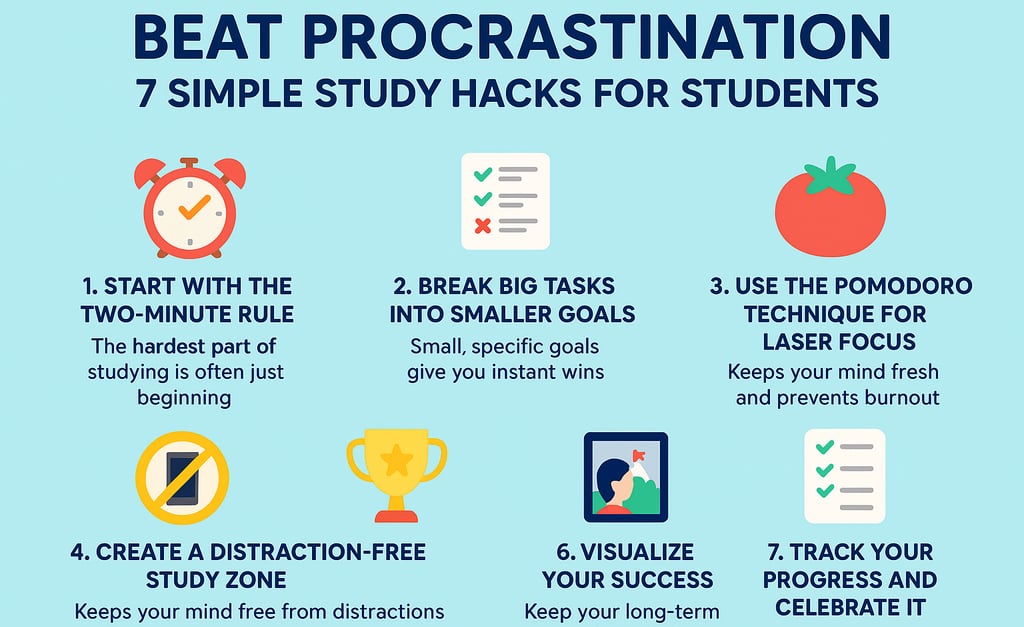Beat Procrastination: 7 Study Hacks Every Student Needs
Struggling to stay focused? These 7 simple yet powerful study hacks—from the two-minute rule to the Pomodoro technique—will help you overcome procrastination, stay consistent, and make exam prep for CUET, CLAT, and CA Foundation more productive.
SCHOOL STUDENT
9/12/20253 min read


Beat Procrastination: 7 Simple Study Hacks for Students
If you’re a student preparing for CUET, CLAT, CA Foundation, or board exams, you’ve probably struggled with procrastination. You sit down with your books, determined to study—but suddenly, scrolling social media feels more urgent, the bed looks too inviting, or you convince yourself, “I’ll start in 10 minutes.” Before you know it, hours are gone.
Procrastination is one of the biggest challenges students face. It steals your time, kills your focus, and piles up unnecessary stress before exams. But the good news is—you can beat it. All it takes is small changes in your study habits. Here are 7 powerful study hacks that will help you overcome procrastination and make your preparation more productive.
1. Start with the Two-Minute Rule
The hardest part of studying is often just beginning. The two-minute rule helps you overcome that hurdle. Tell yourself: “I’ll just study for two minutes.” It sounds ridiculously simple, but it works because once you get started, your brain naturally wants to keep going. For example, opening your book and reading the first paragraph often leads to completing the entire page. This hack is perfect for days when motivation is low.
2. Break Big Tasks into Smaller Goals
One reason students procrastinate is because tasks feel overwhelming. Imagine planning to “complete the entire CUET Quant section” in one sitting. That’s intimidating. Instead, break it down: “I’ll solve 10 questions from Data Interpretation today.” Small, specific goals give you instant wins and a sense of progress. Over time, these little victories build confidence and momentum.
3. Use the Pomodoro Technique for Laser Focus
Studying for long hours without breaks makes your brain tired and unfocused. The Pomodoro Technique is a proven method:
Study for 25 minutes with full concentration.
Take a 5-minute break (stretch, drink water, walk around).
After 4 cycles, take a 15–20-minute break.
This technique keeps your mind fresh, prevents burnout, and makes even long study sessions feel manageable. Many toppers swear by this method because it keeps procrastination at bay.
4. Create a Distraction-Free Study Zone
Let’s be honest—phones are the biggest enemy of productivity. A single notification can pull you into hours of scrolling. To beat procrastination, create a distraction-free study zone. Keep your phone out of reach or use apps like Forest or Stay Focused to block social media. A neat desk with only the materials you need signals your brain that it’s time to study. Even small tweaks like good lighting and a comfortable chair can improve focus.
5. Reward Yourself to Stay Motivated
Your brain loves rewards. Train it to associate studying with something positive. After completing a target—say, revising a chapter or solving a mock test—reward yourself with something you enjoy: a snack, a 10-minute music break, or a short call with a friend. These mini-rewards keep your motivation alive and make studying feel less like a burden.
6. Visualize Your Success Daily
Procrastination often comes from forgetting the “why” behind your hard work. Every day, spend a few minutes visualizing your success. Imagine yourself clearing CUET/CLAT/CA Foundation with a great score, stepping into your dream university or beginning your CA journey. This mental picture gives meaning to your efforts and pushes you to keep going, even when you feel lazy. Visualization is a secret habit of many successful people—it keeps the long-term goal in focus.
7. Track Your Progress and Celebrate It
Procrastination makes you feel stuck. The best way to overcome that feeling is to track your progress. Maintain a study journal or checklist where you tick off completed tasks. Seeing your daily and weekly achievements builds confidence and motivates you to do more. For example, if you finish three chapters in a week, celebrate that progress—it proves you’re moving forward.
Why Beating Procrastination is a Game-Changer
For competitive exams like CUET, CLAT, and CA, time is your most valuable resource. Every day wasted on procrastination pushes you further from your goal. On the other hand, building discipline and consistency gives you a huge advantage over others. Remember, success doesn’t come from studying 12 hours in a single day—it comes from studying 3–4 hours daily with focus and consistency.
By applying these hacks, you’ll not only prepare better for exams but also develop habits that will help you throughout your career. Whether you become a lawyer, a Chartered Accountant, or a professional in any field, the ability to beat procrastination and stay disciplined will always set you apart.
Final Thoughts
Procrastination is natural, but it doesn’t have to define your study journey. With simple yet powerful hacks like the two-minute rule, breaking tasks into chunks, Pomodoro study sessions, distraction-free zones, rewarding yourself, visualizing success, and tracking progress, you can stay motivated and make every study hour count.
At ResultPrep, we don’t just teach subjects—we help students master study skills, motivation techniques, and time management strategies that make success in CUET, CLAT, and CA Foundation possible. Remember: procrastination loses its power the moment you take the first step. Start today.
Prepare for the best results!
Achieve your goals with expert coaching and support from ResultPrep.
Contact us:
© 2025. All rights reserved.
Address:
GSS Complex, 2nd Floor,
16th Cross Rd, HMT Layout, Vidyaranyapura, Bengaluru, Karnataka- 560097
